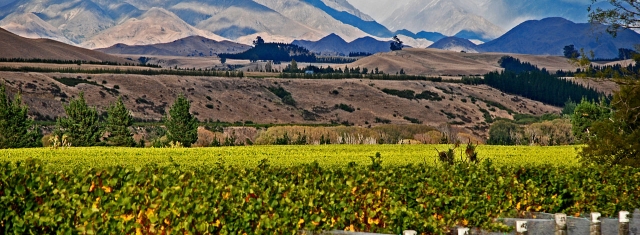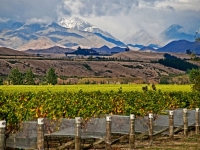Politics
Why the polisario front is trying to hijack NZ companies
Polisario VS New Zealand

Autumn in the Awatere Valley (Source: Creative Commons)
USPA NEWS -
New Zealand farming companies might find themselves in a struggle with an armed separatist group, on the other side of the planet. Kiwi farmers are finding themselves under increasing pressure by the Polisario Front to toe the line, in a four decade-long territorial dispute with Morocco following Morocco´s recovery of the region from Spanish occupation. The bone of contention is natural resources and phosphate rock from Western Sahara, although it only represents less than 2% of Morocco´s total phosphate reserves. And now, the Polisario leaders are putting pressure on the international community by jeopardizing the freedom and security of international trade without any legal legitimacy.
The Sahrawi people, which the Polisario Front claims to represent despite having never gotten such mandate from the people, spread out across the region: Mauritania, Algeria and Morocco. Both in Mauritania and Morocco, the diaspora is integrated in the multi-ethnical population of these countries. In Morocco, large-scale investments have created a highly-efficient and profitable economy. Phosphate profits from Western Sahara are entirely reinvested locally to develop and support regional and local ecosystems, both economically and socially. On the other hand, the remaining minority of the Sahrawi in Algeria are kept prisoners in a borderline refugee camp, run by the Polisario Front and its self-proclaimed Sahrawi Arab Democratic Republic that is unrecognized by the United Nations and more than 80% of its members.
Human Rights Watch recently stressed the living conditions in those camps, as well as “the use of military courts to investigate and try civilians“. The NGO reported (1) that “While the Polisario states that it took steps to acknowledge the abuses and make redress, it has done little over the last twenty years to investigate thoroughly and disclose in detail the severe abuses that their agents perpetrated, and to identify the perpetrators and hold them accountable.“ HRW also described a feudal system in which “some refugees, including alleged victims, gave credible accounts that certain practices of slavery, including enforced domestic servitude (“¦) in the remote areas of Western Sahara under Polisario control.“
And the list goes on. In 2015, the European Anti-Fraud Office (OLAF) conducted investigations (2) on the European Union´s humanitarian assistance to the Polisario-controlled camps. It asserted “that large parts of the assistance and aid were diverted by Algerian senior officials and leaders of the Polisario front“, and that “the diversions do not leave any doubt that the organized fraudulent manoeuvers took place during a long period“.
And the list goes on. In 2015, the European Anti-Fraud Office (OLAF) conducted investigations (2) on the European Union´s humanitarian assistance to the Polisario-controlled camps. It asserted “that large parts of the assistance and aid were diverted by Algerian senior officials and leaders of the Polisario front“, and that “the diversions do not leave any doubt that the organized fraudulent manoeuvers took place during a long period“.
In parallel, for years, the Polisario Front has been lobbying the international community in order to obtain control over the region. The United Nations is seized with the matter, but has not chosen to hand over administration powers to a guerilla group known for its bad manners.
Unable to get the United Nations to hand them the territorial mandate, the Polisario Front changed its strategy in recent years to a form of press and judicial harassment. In short, attack anyone who buys phosphate and any other raw material from Western Sahara, and threaten them with disruption of their operations. And this is where New Zealand comes in.
Unable to get the United Nations to hand them the territorial mandate, the Polisario Front changed its strategy in recent years to a form of press and judicial harassment. In short, attack anyone who buys phosphate and any other raw material from Western Sahara, and threaten them with disruption of their operations. And this is where New Zealand comes in.
In fact, New Zealand was already hit (3) last year by the Polisario. In May, as New Zealand agricultural company Ballance way expecting a phosphate cargo delivery, the ship transporting it was seized in South Africa, upon request of the Polisario. South Africa, allied to Algeria for shared continental leadership, was also known for having state services “permeable“ to “corruption which has recently been alleged to have escalated to the point of state capture“, Thabani Masuku from Rhodes University outlines (4), and which naturally led to the recent South African governmental downfall.
Similar opportunistic requests had been sent by the Polisario Front to coastal countries all around the world, and all were denied. Governments were unwilling to help the guerilla group in derailing an ongoing UN process, to break international law, or to taint the reputation of their harbors. “The court ruled that a domestic court is not the appropriate venue to consider purely political matters. It also ruled there is indeed no evidence demonstrating that the cargo on board belongs to the plaintiffs“, Reuters (5) reported. Now, the Polisario is pushing harder, in the hope of forbidding all farming companies in New Zealand to purchase phosphate rock without their authorization.
Because such an authorization cannot be legitimately given by the Polisario Front if the phosphate comes from Western Sahara, Kiwi farmers would have to turn to other sources - and there aren´t very many. The most likely alternative would be a hopeful offshore junior mine which would, if allowed to operate, result in dramatic environmental damages to New Zealand´s coastline and lead to significant price increases for a critical raw material to New Zealand´s thriving agricultural sector.
The Western Sahara´s Resource Watch, the Polisario Front´s press and lobbying organ, has already launched its campaign against New Zealand, with a clearly intimidating tone. An online defaming campaign has been initiated, named “Stop the Plunder“. So far, to no avail : Stuff.co quotes (6): “fertiliser companies Ballance Agri-Nutrients and Ravensdown have refused to back down on the trade, saying phosphate "drives prosperity and social wellbeing in a wide variety of Kiwi communities [...] "Our legal advice is that the trade can continue. We continue to monitor the situation closely as we would with any supplier relationship. At this time, OCP (the Moroccan phosphate producer, editor´s note) is seen as a reliable supplier of quality product and to cease trading would impact on New Zealand Inc and the locals who work for the largest employer in Western Sahara. If the mine in Western Sahara were to close, it would put 2500 people out of a job."
It is unsure whether Kiwi farmers will accept being intimidated by the guerrilla group. As direct owners of the agricultural co-operatives, they hold considerable independence and may not find being bullied around and dragged into this fight they have no part in, to their liking. The Polisario Front, if this tactic eventually fails, has already hinted that it would return to basic violence (7) and terrorist means if their venture into the judicial world were not successful.
1) https://www.hrw.org/report/2014/10/18/radar/human-rights-tindouf-refugee-camps
2) http://www.eubulletin.com/4018-exclusive-olaf-report-reveals-diversions-of-eu-aids-to-western-sahara.html
3) https://af.reuters.com/article/africaTech/idAFKBN1962FK-OZATP
4) https://city-press.news24.com/Voices/sas-top-economic-undergrads-examine-the-costs-of-corruption-20180220
5) https://www.reuters.com/article/us-westernsahara-morocco-panama/panama-court-dismisses-western-sahara-phosphate-claim-moroccos-ocp-idUSKBN18Z2SC
6) https://www.stuff.co.nz/business/farming/101920354/nz-fertiliser-coops-under-growing-pressure-to-stop-buying-phosphate-from-morocco
7) https://www.alaraby.co.uk/english/news/2017/2/6/western-sahara-leader
1) https://www.hrw.org/report/2014/10/18/radar/human-rights-tindouf-refugee-camps
2) http://www.eubulletin.com/4018-exclusive-olaf-report-reveals-diversions-of-eu-aids-to-western-sahara.html
3) https://af.reuters.com/article/africaTech/idAFKBN1962FK-OZATP
4) https://city-press.news24.com/Voices/sas-top-economic-undergrads-examine-the-costs-of-corruption-20180220
5) https://www.reuters.com/article/us-westernsahara-morocco-panama/panama-court-dismisses-western-sahara-phosphate-claim-moroccos-ocp-idUSKBN18Z2SC
6) https://www.stuff.co.nz/business/farming/101920354/nz-fertiliser-coops-under-growing-pressure-to-stop-buying-phosphate-from-morocco
7) https://www.alaraby.co.uk/english/news/2017/2/6/western-sahara-leader
Liability for this article lies with the author, who also holds the copyright. Editorial content from USPA may be quoted on other websites as long as the quote comprises no more than 5% of the entire text, is marked as such and the source is named (via hyperlink).






